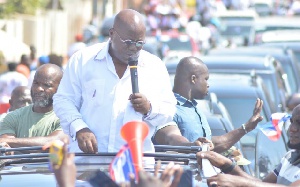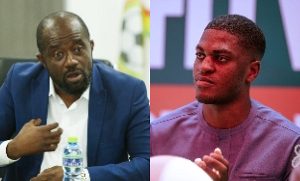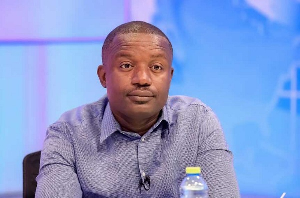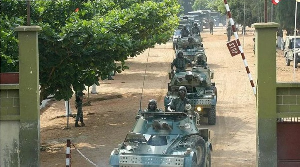A report by Fitch Group, a UK-based research company, has predicted that the flagbearer of the New Patriotic Party, Nana Addo Dankwa Akufo-Addo, will win the December 7 presidential election.
The report, however, envisages that his eventual declaration as the president-elect will be made after a run-off.
This comes just a day after the Economic Intelligence issued a similar report, predicting a one-touch victory for the NPP flagbearer, as well as a win of majority of the seats in Parliament.
The Fitch report makes reference to a recent online poll by management consultancy, Goodman AMC, which puts Nana Akufo-Addo at 49%, with President Mahama of the ruling National Democratic Congress trailing with 44%, thus making it impossible for the incumbent to secure the 50%-plus-one-vote needed to avoid a second-round run-off.
The report predicts that the NPP flagbearer will likely attract the remainder of the opposition vote in the second round and take the NPP to power for the first time since 2008.
The report cited recent developments in the country, including the erratic power supply, known as "Dumsor", and high cost of living as some of the determining factors that would influence Ghanaians into voting for the Nana Akufo-Addo.
According to Fitch, apart from the "Dumsor" menace being a deciding factor, the recent strikes by workers of the Electricity Company of Ghana over the NDC government's plans to privatize the state-run company would also be a key factor.
"As power shortages are a tangible hardship felt by households every day, we expect that this will be the primary concern of voters. In the Goodman AMC poll, 43% of respondents cited these as a primary concern," the report said.
The report added: "Economic troubles will play in opposition's favour. Over the past several years ,the Ghanaian economy has suffered a number of macroeconomic setbacks, with real GDP growth slowing from an average 9.7% over the four years from 2010 to 2013, to just 3.8% from 2014 to 2016 and we expect that this will also support the opposition at the polls.
Ghana's budget and current account deficits widened, the currency sold off and inflation skyrocketed, forcing the government to go to the IMF for assistance in late 2014. Finance minister Seth Terkper has insisted in recent media statements that this was solely the fault of a slump in commodity prices."
Another development, the report noted, that would play in NPP's favour would be the third programme review under the IMF, which forced the NDC government to push back a proposed Eurobond issuance.
The Fitch report makes reference to the fact that Nana Akufo-Addo had assured that the next NPP government would respect any agreement with the IMF and support investor confidence, although he has said that he would renegotiate the terms if necessary.
"On August 2, parliament passed a bill allowing the government to borrow up to 5% of the previous year's revenues from the central bank. This is less than the 10% previously allowed, but the IMF had made it a condition of its lending that the facility was removed entirely.
In the wake of the bill's passing, investor fears over the potential that Ghana would fail its review was a likely reason for required yields on the proposed Eurobond jumping," the report notes.
General News of Saturday, 22 October 2016
Source: Statesman

















